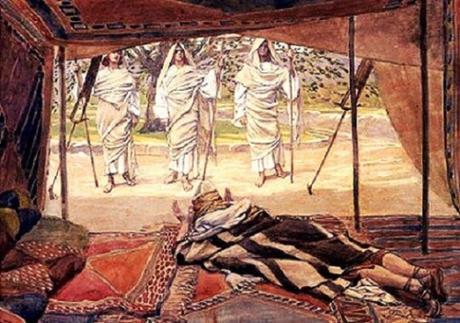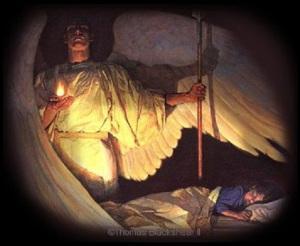Genesis 18:1-10
The LORD appeared to Abraham by the terebinth of Mamre,
as he sat in the entrance of his tent,
while the day was growing hot.
Looking up, Abraham saw three men standing nearby.
When he saw them, he ran from the entrance of the tent to greet them;
and bowing to the ground, he said:
“Sir, if I may ask you this favor,
please do not go on past your servant.
Let some water be brought, that you may bathe your feet,
and then rest yourselves under the tree.
Now that you have come this close to your servant,
let me bring you a little food, that you may refresh yourselves;
and afterward you may go on your way.”
The men replied, “Very well, do as you have said.”
Abraham hastened into the tent and told Sarah,
“Quick, three measures of fine flour! Knead it and make rolls.”
He ran to the herd, picked out a tender, choice steer,
and gave it to a servant, who quickly prepared it.
Then Abraham got some curds and milk,
as well as the steer that had been prepared,
and set these before the three men;
and he waited on them under the tree while they ate.
They asked Abraham, “Where is your wife Sarah?”
He replied, “There in the tent.”
One of them said, “I will surely return to you about this time next year,
and Sarah will then have a son.”

The above passage from Genesis 18 is one of many passages in the Bible referring to angels, so many that, as (still) Pope Benedict XVI said in 2009, “We would eliminate a significant part of the Gospel” if we did not believe in angels.
The word “angel” is derived from the Greek word angelos, which simply means “messenger.” They are couriers of the divine—incorporeal spiritual beings who act as intermediaries between God and humanity. As St. Augustine (AD 354-430) explains: “Angels are spirits, but it is not because they are spirits that they are angels. They become angels when they are sent. For the name angel refers to their office, not their nature. You ask the name of this nature, it is spirit; you ask its office, it is that of an angel, which is a messenger.” In other words, angels are defined by their function as message-bearers, although this capacity does not exhaust their activities.
To the question of why God would need messengers, the answer is “Of course, not.” God doesn’t need anyone. But our creator God is so bursting with protean creativity that He has fashioned and will continue to create every imaginable and unimaginable, animate and inanimate, that inhabit the fullest range and spectrum of what is possible.
Philosophers and theologians through the ages have offered thoughtful arguments for the possibility and existence of angelic beings. One of the most famous accounts is that by St. Thomas Aquinas (1225-1274).
According to Aquinas, there are four kinds of substances that are commonly known in the world. They are mineral, vegetal, animal, and human—the last substance being an amalgam of the first three, but with something more. Like animals, human beings have bodies; but unlike animals, humans also have souls, and so are made of both corporeal and spiritual substances. The four kinds of substances comprise a series of grades in the universe, all of which, “participate and represent the goodness of God in various ways.” Aquinas then reasoned that the gradation of substances is completed by the inclusion of another kind of being intermediate between God and humans, which is made of purely spiritual or incorporeal substance. The angelic pure spirits would thus “round out the order of things” because a created universe that does not include such beings will have failed to realize an important range of possibilities.
Similarly, philospher René Descartes (1596-1650) in Meditations On First Philosophy, reasoned that since human beings are composed of mind and body — “a thing that thinks” instead of just a body, which is “not a thing that thinks” — Descartes then concluded that there would also be minds without bodies, i.e., pure spirits or intelligences.
For his part, American philospher Mortimer Adler (1902-2001), who wrote an entire and very serious book on angels (Angels and Us), correctly concluded that in the last analysis, the existence of angels turns on whether God exists for the simple reason that, being divine messengers, angels depend on God for their very creation and existence. In his book, How To Think About God, Adler frames the question concerning the existence of God in the following manner:
“If we are persuaded that the physical cosmos is not the ultimate, inexplicable, and uncaused reality, then we are under a rational obligation to posit the existence of the supreme being as the supernatural—and uncaused—cause that explains the preservation of the cosmos . . . [as well as] its creation.”
In the end, despite his self-identification at the time as a “pagan” (which he defines as an irreligious person who does not worship the God of Christians, Jews, or Muslims), he concluded that “we have reasonable grounds for believing in God, not with certitude, but beyond a reasonable doubt.” Born a Jew in 1902, Adler was an agnostic for most of his life. Although he held a rational belief in a transcendent supreme being, he insisted that he lacked the gift of grace, finding himself unable to cross what he called the “great gulf between the mind and the heart.” In his last years, however, he made that transit. In 1984, bedridden with illness, he sought solace in prayer and finally accepted the grace he had long sought. After a lifetime as a pagan, Adler professed his belief “not just in the God my reason so stoutly affirms . . . but the God . . . on whose grace and love I now joyfully rely.” He died a Roman Catholic, on June 29, 2001.

Being powerful pure spirits without bodies, angels are therefore invisible and genderless. Though invisible, they can assume physical form when they interact with human beings, as three of them did in Genesis 18, appearing as three men to deliver to Abraham an important message from God — that Abraham’s elderly, way past menopause wife, Sarah, will bear a son, which of course is a miracle.
Since angels can assume physical form when they interact with human beings, in theory, that form does not necessarily have to be human, which is a fascinating thought indeed.
So how do we know when it’s an angel?
When the form, be it human or animal or . . . , delivers an important message, the nature of which always is to urge you toward the good.
Has that happened to you?
For true stories of angelic encounters, go to our “Angels and Saints” page for all the post-links colored green. Here’s a simple but lovely prayer to our wonderful guardian angels, by St. Bonaventure (1221-1274):
Angel of God, my guardian dear,
to whom His Love commits me here,
ever this day be at my side,
to light and guard,
to rule and guide. Amen.
And may the Peace and Joy and Love of Jesus Christ our Lord be with you this glorious Sunday!
~Eowyn

